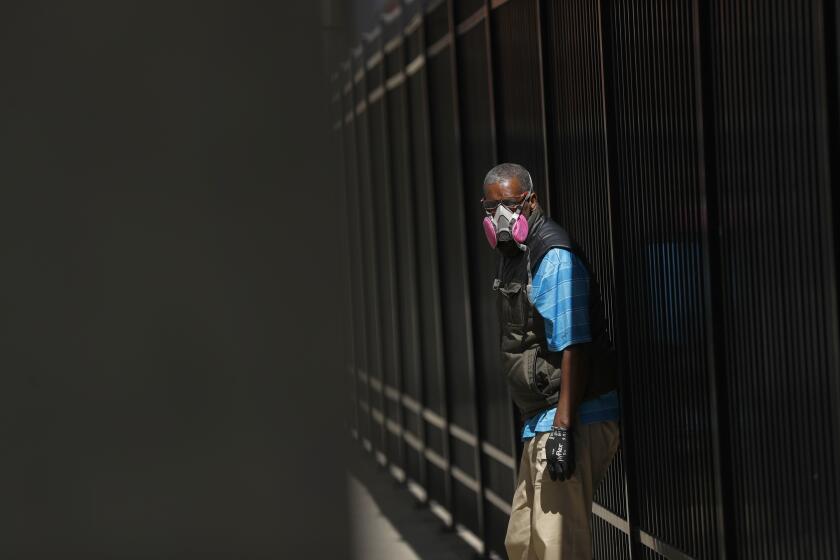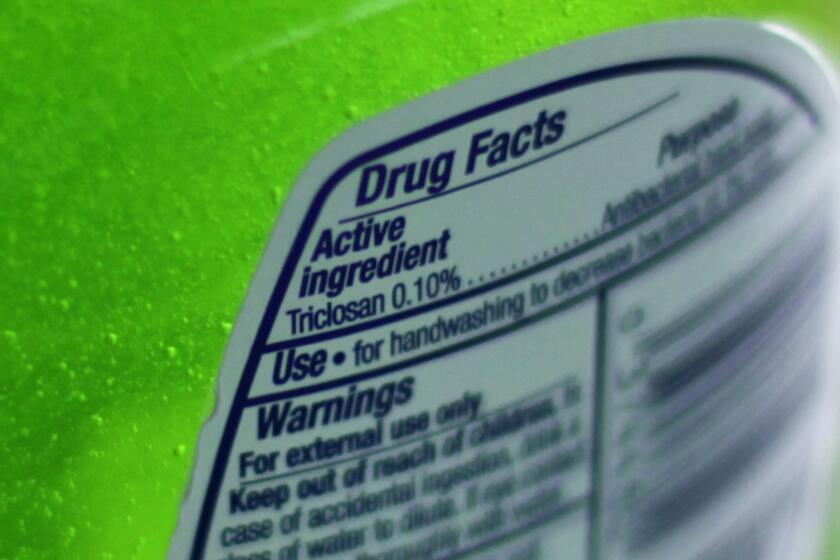Coronavirus and disinfectant: Why you shouldn’t ingest it

- Share via
At a White House briefing Thursday, President Trump speculated about whether doctors might try to put disinfectants in the human body to combat the coronavirus, perhaps by an injection.
Scientists had an emphatic response to that idea: Absolutely not.
For the record:
9:24 a.m. April 25, 2020An earlier version of this article said bleach is an acid. It is usually a base.
“The idea of injecting something into yourself — if that doesn’t sound like a patently bad idea to start with, I don’t know how else to describe it,” said Bill Carroll, a chemist at Indiana University.
It is never a good idea to put such chemicals into your body. Do not do it. You can end up sick or dead, and whether or not you survive, the experience will be extremely painful, experts say.
But, if you really want to understand why putting disinfectants into your body is such a bad idea, read on.
Consider a common ingredient in many disinfectant products, bleach.
Bleach is a term for a chemical that can lighten or remove color, said Dr. Rais Vohra, medical director of the California Poison Control System’s Fresno/Madera Division. Household bleach usually contains sodium hypochlorite in a solution that should be further diluted in large amounts of water before it is used at home on clothes or surfaces.
Bleach is a corrosive or caustic chemical, which means that when it touches living cells — such as the germs in your bathroom — it basically destroys their cell membranes.
Guess what? It does the same thing to the tissues in your body, too.
The FDA warns that President Trump’s much-touted coronavirus drugs could cause deaths. The White House says media ‘irresponsibly’ reported his words.
“The reason it works so well on our clothes and on our tabletops and things like that is it kills biological tissues just on contact,” Vohra said.
When exposed to such caustic substances, your cell membranes rupture and your cells immediately die. Then your body cranks up its inflammation reaction, which leads to swelling.
That’s why ingesting bleach can result in burns to the mouth, esophagus and stomach, Vohra said. If accidentally inhaled while choking or coughing, it can do severe damage to the cells in your lungs.
In some cases, the swelling in your throat can choke off your air supply.
“One of the most horrific things I’ve seen as an emergency physician and a toxicologist is seeing someone who has swallowed a corrosive chemical — and then within the course of 90 minutes to two hours, they’re having a life-threatening or fatal reaction,” Vohra said.
In short: The reason bleach is so good at killing germs is pretty much the same reason it’s good at killing your bodily tissues. Bleach does not play favorites.
“The chemicals don’t really know what’s a microbe and what’s a human cell,” Vohra said. “That’s what makes them so dangerous.”
What do scientists wish they knew about the coronavirus? Which treatments actually work, what antibodies are good for, and which public health measures help.
The maker of Lysol disinfectant products, Reckitt Benckiser Group, also weighed in on the president’s comments.
“Under no circumstance should our disinfectant products be administered into the human body (through injection, ingestion or any other route),” the company said in a statement.
Another common ingredient in household disinfectants, including many Lysol products, is benzalkonium chloride. It is also very caustic, so its effects on living tissue end up being quite similar, Vohra said.
By injecting a disinfectant like Lysol into your veins, “you would basically just burn them from the inside out,” Vohra said. “That would be extremely painful, it would lead to other complications like infection, and it may even lead to further damage that would require surgically removing those damaged body parts.”
Unfortunately it’s not entirely unheard of, he said, pointing to very rare cases of people — typically under the influence of drugs that hamper judgment — injecting such substances into their bodies.
Contrary to viral videos, the FDA says to not use dish soap to wash fruits and vegetables because soap is not meant for human consumption and could make you sick.
Officials were concerned about Americans’ exposure to such chemicals even before Trump’s comments. Calls to poison centers about exposure to cleaning products and disinfectants have risen by 20.4% and 16.4%, respectively, according to a Centers for Disease Control and Prevention report released earlier this week.
That may be due in part to the fact that more people are spending more time at home and using cleaners to minimize the risk of coronavirus transmission.
Used in the right way and on the right targets — that is, inanimate, non-living shared surfaces — such cleaners do their job fine, Carroll said.
Any other uses involving ingestion, he added, should be off the table.










